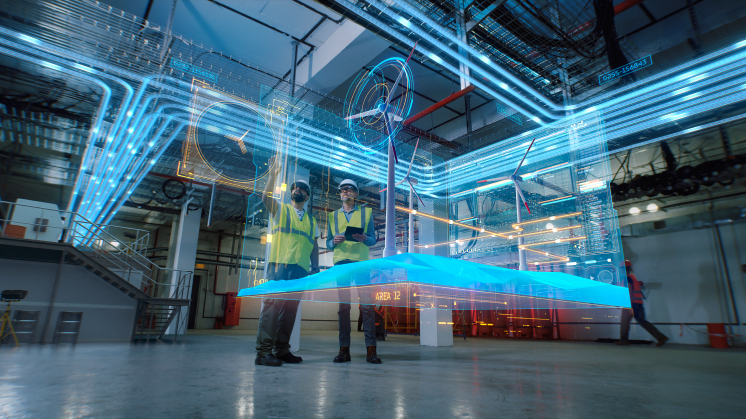Blockchain in the energy market
How can blockchain be used to certify the source of green energy?
R&D Blockchain Iberdrola projects
At Iberdrola group we have begun a pilot project based on using blockchain to guarantee, in real time, that the energy supplied and consumed is 100 % renewable. Using this technology, we have managed to link plants where electricity is produced to specific points of consumption, allowing the source of the energy to be traced. This increases transparency and ultimately encourages the use of renewable energy.
Blockchain is here and is revolutionising the electricity market. This technology is an efficient way of allocating generation assets to a specific point of consumption, and can even be used to establish a hierarchy of priorities when it comes to sources of origin. This allows renewable energy certification processes to be sped up and automated, as there is a greater degree of traceability.
This aspect is crucial in the case of long-term Power Purchase Agreements (PPAs) based on renewable assets, as these agreements specify the need to certify that the energy supplied is from 100 % green sources. These agreements play a fundamental role today, because they promote renewable energy growth by encouraging large corporations to purchase this type of energy.
Blockchain also guarantees the transparency and security of the transaction, which remains permanently recorded in the platform, allowing all parties to audit the results. This technology also makes it possible to work under smart contracts which are performed automatically when both parties fulfil the agreed terms, thereby cutting out intermediaries and simplifying the process. This reduces costs and increases privacy.
Which are the uses of blockchain?
Blockchain is a transfer of digital data, with very sophisticated encryption, between multiple interconnected nodes which record and validate it.
Benefits
-
No intermediaries
-
It cannot be altered
-
It cannot go down and information cannot be lost
-
Traceability
-
Privacy
Uses
 SEE INFOGRAPHIC: Which are the uses of blockchain? [PDF]
SEE INFOGRAPHIC: Which are the uses of blockchain? [PDF]
External link, opens in new window.
We connect clients to green energy generation points
We believe blockchain is a key tool to speed up the process of decarbonising the economy, as it makes transactions traceable, secure and quick. This technology makes the supply of green energy more efficient, flexible and transparent, which incentivises the production and consumption of 100 % renewable energy.
In this regard, we have launched a pilot project aimed at connecting the Oiz (Biscay province) and Maranchón (Guadalajara province) wind farms and the San Esteban hydroelectric plant (in Orense province) with the offices of Kutxabank and Euskaltel (both in the Basque Country), as well as with the Iberdrola Tower in Bilbao and the Iberdrola Campus in Madrid. Blockchain gives these customers the guarantee that the electricity they receive and use in their buildings is 100 % clean and allows them to trace its source.
To carry out this initiative, we were supported by the Energy Web Foundation, a scalable, open-source blockchain platform specifically designed to meet the regulatory, operational and market needs of the energy sector. We have also designed a user-friendly web environment which lets customers view data on the process and identify which plants the green energy consumed comes from.
A key pilar in our digital transformation
Blockchain is one of the pillars of our digital transformation strategy, and is the leading private utility in Europe and the world's second by investment in R&D*, – with an investment of €2 billion in the last decade, and committed to invest €385 million a year until 2026.
Not only do we use this technology to certify that energy comes from a renewable source, we also use it to ensure electronic transactions and smart meters against cyber attacks and to streamline contracts between the companies in our group.
Among other initiatives, we are participating, along with other corporations in the sector, in a project to test the use of blockchain in sales transactions in wholesale energy and natural gas markets. The aim is to allow two operators to make transactions on a peer-to-peer basis, cutting out the need for third parties and intermediaries. These operators will buy and sell energy directly, without an established market, and their transactions will be registered on the platform anonymously and in encrypted form to be verified by other operators.
In our distribution business, blockchain-based initiatives are mainly aimed at certifying information about network events with the potential to have an impact on customers. Progress is thus being made on digitalising the network as well as improving service quality and customer service.
* According to the The 2020 Industrial R&D Investment Scoreboard report by the European Commission.

Digital transformation
Digitalisation has become a key ally for companies to seize opportunities.

Smart grids
Smart grids ensure the incorporation of more renewables and are positioned as a vital cornerstone of the energy transition.

Our innovation model
Our vision in terms of innovation is to drive the development of disruptive and sustainable technologies.

Iberdrola Innovation and Training Campus
It embodies the group's commitment to technology, R&D and collaboration with technology for leading the energy transition.





